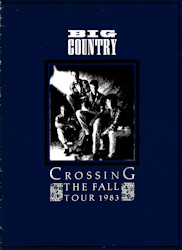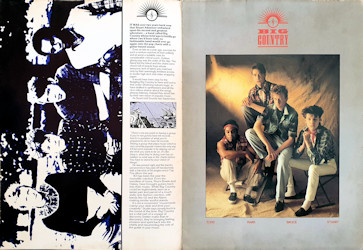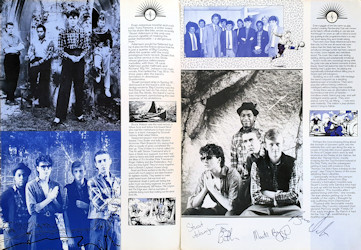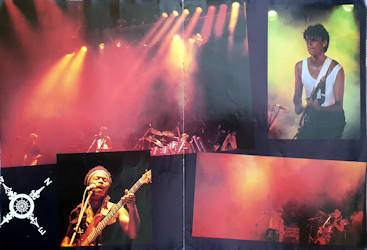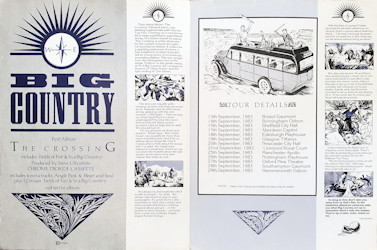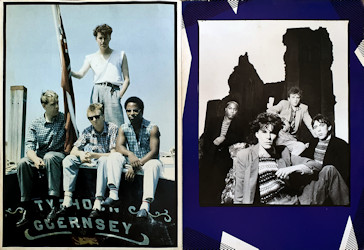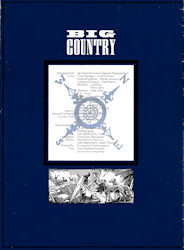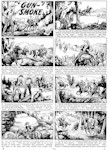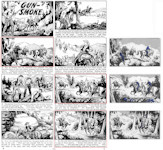Narrative from programme:
IT WAS over two years back now that Stuart Adamson embarked upon his second and greatest adventure - a band called Big Country whose brief was to boldly go
where (we'd been told) no fashionable band would ever go again: into the pop charts with a guitar-based sound.
Even as late as a year ago, success for such a venture seemed at best unlikely and at worst a suitable case for considerable critical scorn. Gutless glossy pop was the order
of the day. The bland led the bland and the charts were chock full of treacle boys whose awesome lack of talent was matched only by their seemingly limitless access to studio
high-tech and video wrapping paper.
It would have been easy for the fledgling Big Country to have sold out to that under-whelming industry logic, to have drafted in synthesisers and all the nice-videos-shame-
about-the-songs phoney baloney. Instead they stood fast by their own vision of popular music.
As Stuart told Sounds last September. "There's not any point in having a group if you're not gonna have hit records .. but it's a question of what you're prepared to do
to have hit records. Having a group that plays music which is not currently popular means the only way it'll become popular is by staying out on the limb you want to be on.
It's like Dexy's, what they're doing now has no relation to what was in the charts before. You have to stand by your vision of things."
He was proved right and the band's perseverence has paid off handsomely with a hat-trick of hit singles and a Top Five album this year.
'83 has been the year the monolith cracked. Even the trendiest of icons, Mssrs Bowie and Oakey, have brought guitars back into their music. While Big Country could be
legitimately seen as a tartan part and parcel of a much wider anti-fashion reaction, with bands like U2 and the Alarm making similar soulful stands.
It's not a movement "movements cramp your style and limit your creativity" Stuart says simply but it is the mood of the time. Big Country are a vital part of a voyage
of discovery (better make that re-discovery), they're bringing feeling, emotion and spirit back into the charts and resurrecting the role of the guitar in pop music.
Even notorious novelist and rock critic Tony Parsons, a writer noted for his shark-like bite, wrote recently "Stuart Adamson is the only one around capable of making the
guitar fashionable — a dangerous man.
Adamson would be flattered but he'd also be the first to stress that he is just a quarter of Big Country, albeit the quarter with the most prestigious track record. Stuart
first saw active service in the Skids whose glorious rollercoaster melodies, with their 18 carat Adamson guitar hallmark and Richard 'Big Yin' Jobson's he-man vocals, first
raided the Top 30 in '79, three years after the band's formation in downtown Dunfermline.
Stuart jumped ship in Spring '81 , distressed at the band's drift into dodgy esoteria. Big Country was the first thing he had on his mind. And just like the Skids, the band's
name was important, symbolising the vast expanse of his ambitions.
Bruce Watson was the next recruit, a fellow Scot and fellow fret-board fiend who had the misfortune to have once been in a band managed by Sounds' Johnny Wall called Delinx.
Seasoned session men beefy black bassist Tony Butler and lofty dipstick drummer Mark Brzezicki (try saying that after a couple of gins) completed the line-up. They'd been in
a band called On The Air with Simon Townsend who'd been a Skids tour support, but their real claim to fame was their session work with the likes of Si's brother Pete Townsend,
Roger Daltrey and the Pretenders. And boy are they tight! They're more together than a British Leyland closed shop.
Stuart and Bruce worked on the Big Country sound with much patience and determination for eighteen months. They wanted to make guitar-based music that was fresh and
inspirational, Stuart in particular feeling that guitar music was being neglected, the guitar written off prematurely. Bill Nelson, Nils Lofgren and The Edge were cited as
examples of guitarists doing more than trotting out the same tired riffs.
Even a gaggle of low-key warm-up gigs, London's swanky Membership Club was chosen as the bands official unveiling in July last year. And though I've sworn an oath in blood to
avoid any gushing in this programme there's no way I can avoid saying they were breath-taking.
There were more Skids references back then than now, but the over-all sound was more mature than the Skids had ever been The tumultuous teenage tumble had been replaced by a
richer, more majestic and melodious sound. The music they made was swirling, stirring and unashamedly emotional.
Stuart's vocals were surprisingly strong while the guitar inter-play achieved moments of sheer beauty. Stuart had staked his claim for the title of thinking man's guitar hero,
his playing was inspirationally individual without falfing prey to Verlain-style self-indulgence.
Building on a rich celtic folk heritage the band conjured up a dazzling kaleidoscope of emotions. They were populist without being cretinous, intelligent without being inaccessible.
At last there was an alternative to that horrendous hat-trick of harpies — mindless metal, bland pop pap, and self-indulgent avante-garde. They were joyous, tune-ful, up-lifting...
I was won over instantly. The nation's pop-pickers weren't long to follow.
Perhaps the most amazing thing about this triumph of (pioneer) spirit, was the relatively few cock-ups along the way: a couple of luckily little-known giglets with Sir Alice
of Cooper which were as well received as Ian Paisley at the Vatican, the debut disc 'Harvest Home' merely scraping into the Top Hundred instead of the Dirty Thirty, and the
subsequent parting of ways with producer Chris Thomas ("he didn't have a feeling for the group", says Tony) in favour of the more satisfying Steve Lillywhite.
I personally reckon the person who suffered most from Big Country's formative months was Stuart's lovely wife Sandra who had to put up with his bouts of midnight inspiration.
"For months after I started living with him," she reveals, "he was always getting up in the middle of the night. I thought he was suffering from Diarrhorea!" ,
Flushed with favourable media reaction, Big Country released their second Mercury single 'Fields Of Fire' early this year. By March it had hit the Top Ten, establishing a
healthy precedent.
Their debut album 'The Crossing' followed suit in July, blasting a passionate path into the Top Five. Chewing on a restraining bit to keep superfluous superlatives at bay, I'll
content myself by saying 'The Crossing' is a fine showcase for the myriad musical strengths I've touched on before. It makes for a sparkling statement of intent, a first instalment
of what I'll predict will be a long series of increasingly innovative platters. This one ranges from the Springsteen feel of the single 'Chance' to the gentle sweep of 'In A Big
Country' the contagious bounce of 'Close Action' and the epic ending of 'The Storm'.
The lyrics are equally wide-ranging, at times intensely personal as on 'Inwards' and at other times strictly global as with the anti-nuclear '1,000 Stars' — 'Now we play our final
hand/Move in closer, understand/This time like never before/Only the black queen scores/A card so high and so wild/We should burn it.'
"I'm not going to sit down and preach," Stuart says. "But I think music can possibly be more than mere entertainment. And if by us talking about things like that it
makes others think about the issues then I'm glad. We might have helped in a small way. And if we can cut down the bullshit about the star system at the same time then maybe that
helps as well.
We always try and make the effort to talk to people," he adds, "We always stay beind at gigs to sign autographs. It's great and it's also important to have that contact
and show people that there's nothing magical about groups — or the people in them anyway — and that they're just very ordinary fragile, stupid human beings.
With the likes of Leonard Cohen amongst his admitted influences, it's obvious Stuart is serious about what he's doing — "I do treat it seriouly because I put a lot of myself
into it. But I think you can be serious without being po-faced."
He's also very sincere. He and Bruce have already bought a cheap van to rent out to local bands for just petrol costs and when the money comes in they plan to set up a club in
Dunfermline complete with rehearsal rooms and studios. Exactly what Joe Strummer promised to do when he was starting off in '76 but never did. My money says Stuart will keep his
promise
In the meantime this British tour is chased by some States dates. There's very little doubt that Big Country have got the potential to follow U2 into the Billboard Top Thirty.
The Americans loved us when we did the clubs in New York." Mark says referring to a short previous jaunt. "I think they could really take to us."
As long as they don't take you away from us that's fine. In the meantime whenever someone asks you what Big Country are up to remember there's only one answer. They're
up to date, mate, stand on me.
Garry Bushell
BIG COUNTRY
First Album
THE CROSSING
includes 'Fields of Fire' & 'In a Big Country'
Produced by Steve Lillywhite.
CHROME DIOXIDE CASSETTE
includes 4 extra tracks 'Angle Park' & 'Heart and Soul'
plus 12" mixes 'Fields of Fire & 'In a Big Country'
not on the album
TOUR DETAILS
13th September, 1983 - Bristol Gaumont
14th September, 1983 - Birmingham Odeon
15th September, 1983 - Sheffield City Hall
17th September, 1983 - Aberdeen Capitol
18th September, 1983 - Edinburgh Playhouse
19th September, 1983 - Glasgow Tiffanys
20th September, 1983 - Newcastle City Hall
22nd September, 1983 - Liverpool Royal
25th September, 1983 - Manchester Apollo
26th September, 1983 - Nottingham Playhouse
27th September, 1983 - Oxford New Theatre
28th September, 1983 - Southampton Gaumont
29th September, 1983 - Hammersmith Odeon
* NOTE: Dates may change and additional dates may be added.
CREDITS
Management: Ian Grant for Grant-Edwards Management
Crew: Tour Manager — Jeoff Trumps
Sound Engineer — Sheds Jackson; Lighting Designer — Peter Barns
Backline — Les King, Bob Lopes
Monitors — Little John; P.A. — Entec; Lights — Chamelion
Trucks — Transam; Minibus - Vansam; Travel - Trinifold Travel
Catering - Home Cooking
Agency: TBA Record Company
Country Club: Martin and Jacky, 25a Crawford Street, London W1
Merchandising: ATP, 26-40 St Andrews Street, Northampton. Tel (0604) 20411/2/3
Designed: Chris Pork, Phil Garner
Photos: Sheila Rock, Paul Cox, John Blackmore, Justin Thomas
Printed By: Grosvenor (Northampton)
Text: Gary Bushell (Sounds)
Special Thanks to Hugh Birley
|
